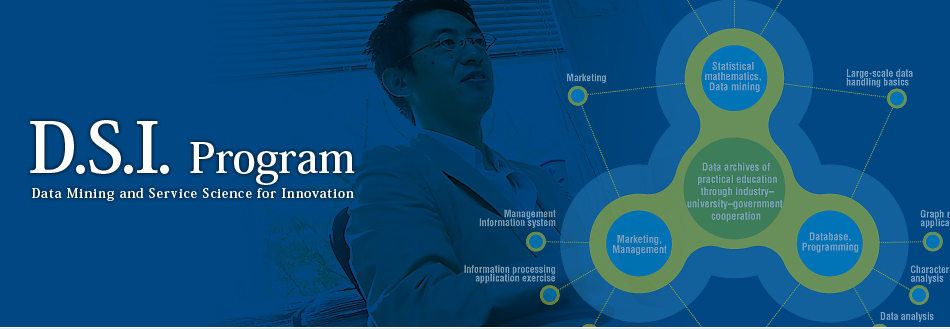
An environment of ubiquitous computing is spreading rapidly, and an enormous amount of detailed, business process—related time–series data, such as website logs, sensor data, and transaction data, is accumulating in and outside companies. Social needs for data mining, which attempts to understand the dynamics of business scientifically and attempts to discover new information based on such data, are growing. The process innovators are human resources who can understand the dynamics of value creation processes and create new businesses based on newly acquired information. They are required to have, firstly, the ability to understand and think of complicated phenomena scientifically, and secondly, planning skills and practical skills—the ability to take action by making good use of newly discovered information. To achieve this, the project provides students with the knowledge of high–level statistical mathematics and data mining and with basic education regarding social science.
This three–year project aims at developing a program that will foster and educate undergraduates into full–fledged process innovators who can scientifically and practically analyze business processes. This project intends to develop the Data Mining and Service Science for Innovation [DSI] program, designed to provide students with a high–level knowledge of statistical mathematics and data mining and basic education in social science, thus fostering human resources who can resolve business processes scientifically and practically. This program focuses on marketing–related issues as a prototype of business process analysis that uses large–scale data, and a developed educational program that enables students to discover knowledge from a massive amount of time–series data related to consumers' purchasing behavior. Students undergo plan–proposing training based on advice from companies, to enable the acquisition of skills through practical training. Companies can effectively use huge amounts of data that has not yet been used and through which they can expect a discovery of new needs. The goal of this project is to produce innovators who have high–level skills as part of a work–force, and at the same time, who can contribute directly to society.
Data mining (Knowledge discovery in databases)
Data mining is a process through which to accumulate and learn patterns and proclivities discovered from voluminous database as a knowledge base and to discover and learn new knowledge. A data mining system is a knowledge acquisition system that mines such knowledge from databases. Thus acquired knowledge is accumulated as a knowledge base in and outside computers. The system is intended to realize the generation of knowledge while minimizing human intervention. Data mining can also be called knowledge discovery in database, or KDD.


What I would like students to acquire through this program is the ability to carry out a project independently. This is a severe challenge but it is a minimal requisite in the business world. It is highly entertaining and interesting to create something independently, unlike the deskwork to memorize designated pieces of information efficiently as they experience in preparation for university entrance examinations. In the business world, what you carry out by yourself produces results, which can be profits or people's smiles. In the business world, you create what is unknown on your own and see your ideas made good use of in society. Such experiences will provide you with wonderful feelings of accomplishment. I believe that being involved in such challenges is extremely interesting to students. In this project, students will present business proposals to companies in the stage of a practical education program. To propose plans that are prospective as business, students are required to have high–level problem–setting ability. To acquire this, being familiar with actual business practices is important. To learn consumers' purchasing behavior, working as a checker will teach you many things you did not know. It is also important to develop judgment skills to handle unreasonable data that cannot be resolved only by the combination of the programs included in the education curriculum. Industry–university cooperation workshops will screen students extremely severely. What companies demand are the skills by which to independently discover problems, find solutions to them, make profitable plans, and perform presentations. Many students may experience great disappointment. However, after students join the business world, they need to acquire the ability to go through these challenges. We plan to start the project with about 20 students in the first and second fiscal years. We will accumulate administration know–how and develop a high–quality education program. Based on these, we will develop efficient courseware in the future, and will launch the program with about 50 students. We thank you very much for your understanding of and cooperation with this project.
Katsutoshi Yada, Ph.D. Professor of Management Information System, Faculty of Commerce, Kansai University
He completed his Doctorate at Kobe University of Commerce, Graduate School of Business Administration in 1997. After teaching at the Department of Business Administration, Osaka Sangyo University, he joined the Faculty of Commerce, Kansai University, in 2000. As a graduate student, he worked on the frontlines of business at multiple companies to apply information technologies to business, and has been committed to research on the application of data-mining technologies to business. He is the first Japanese researcher whose paper has appeared in the KDD&DM (an international journal).
Chairman, Business Mining Workshop (Data Mining Olympics)
1995 Kanematsu Fellowship in Research Institute for Economics & Business Administration at Kobe University
2002 Encouragement Awards of Japanese Society for Artificial Intelligence
2006–7 Visiting Scholar, Graduate School of Business, Columbia University, NY, U.S.A.



